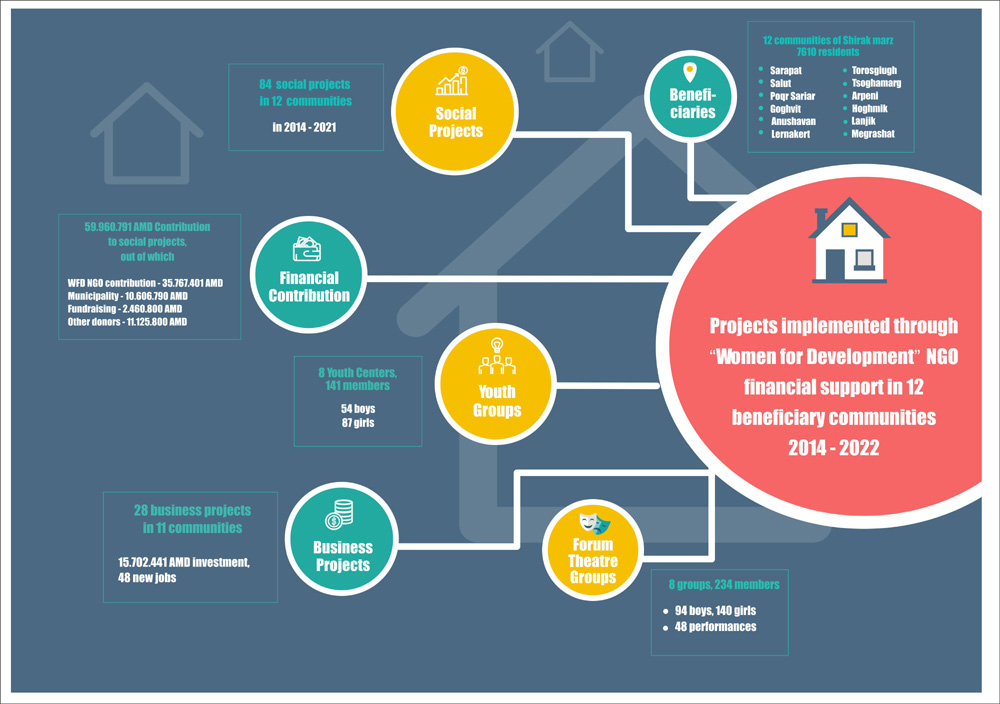We value long-term and consistent work in the communities, with the goal of empowering them and securing long-lasting impact.
The organization’s first steps began from working in 70 rural communities of Shirak province, mostly through implementation of family planning, healthy lifestyle, HIV/AIDS prevention and women’s rights projects. Nearly 10 years’ experience of working in rural communities of the province, familiarity with the population’s issues and trust towards the organization, became the basis for development of new working approaches by us. Thus, starting from 2008, “Women for Development” NGO initiated its systemic approach towards rural community development in 15 villages of Shirak province, based on “Not for the community, but together with the community” principle. Commitment to this principle is the main guarantee for our success in rural development.
In 1998-2014, the organization worked in 70 rural communities of Shirak province, and from 2014 and onwards it is actively working in 12 communities of the province. 7610 people are beneficiaries of the organization, including local government representatives, youth, schoolchildren and community active members.
*A brief historical overview of the beneficiary villages and summary information about the projects implemented by WFD NGO can be found on the interactive map .
The beneficiary communities of “Women for Development” NGO are:
8 villages of Sarapat consolidated community, Lernakert , Anushavan, Lanjik and Megrashat
The main goal of the community development component is to improve the quality of life of the target villages’ population with the support of locally established active groups.
Based on its previous experience, the NGO also developed its own and very effective methods and mechanisms of working with rural communities. As the result, our target communities have become stronger, unified and able to independently analyze and evaluate their existing needs and opportunities.
Below are 6 main steps, describing WFD NGO’s rural community development approach:
- 1) Community mobilization;
2) Increased participation;
3) Capacity development of community members;
4) Raising local issues;
5) Promoting local businesses and social projects; - 6) Conflict management.
To achieve these goals, the organization has developed clear steps for implementing activities in the communities, and these steps are divided into two main parts.
The first part is preparatory work, which is based on the capacity building of the local residents, including promoting community participation, volunteerism, community mobilization, and the ability to identify and present the community issues.
The second part of our intervention is practical work, which includes resolution of social issues, funding projects developed by community active groups, promotion of entrepreneurship and assisting the formation of small businesses. This stage also involves presenting the issues of beneficiary communities to potential donors and partner organizations, with the goal of securing additional financial and technical assistance.
As the result of this approach, there are visible positive changes in all our beneficiary communities. As the result of implemented 84 social projects, the issues of productive organization of children’s, youth’s and adults’ spare time have been resolved. Community infrastructure issues have been partially resolved, including installation of street lights, renovation and furnishing of community events halls, installation of public bus stops, establishment of cultural clubs and several projects related to promotion of sports and healthy lifestyle. The main result of the social projects’ implementation is the strengthened trust between local government, community residents and WFD NGO. All projects implemented in the communities include financial investments by local government, and those projects which contain construction and renovation components are fully implemented with the efforts of local volunteers and monitored by the village mayors.
With the support of WFD NGO, community-based NGOs were established in 4 beneficiary villages. They are already making first independent steps and creating certain positive environment, which brings confidence especially to the community youth. This is one of the best ways for keeping youth motivated to stay in their villages, creating activities for them, providing opportunities for voicing their ideas and participating in resolution of community issues.


